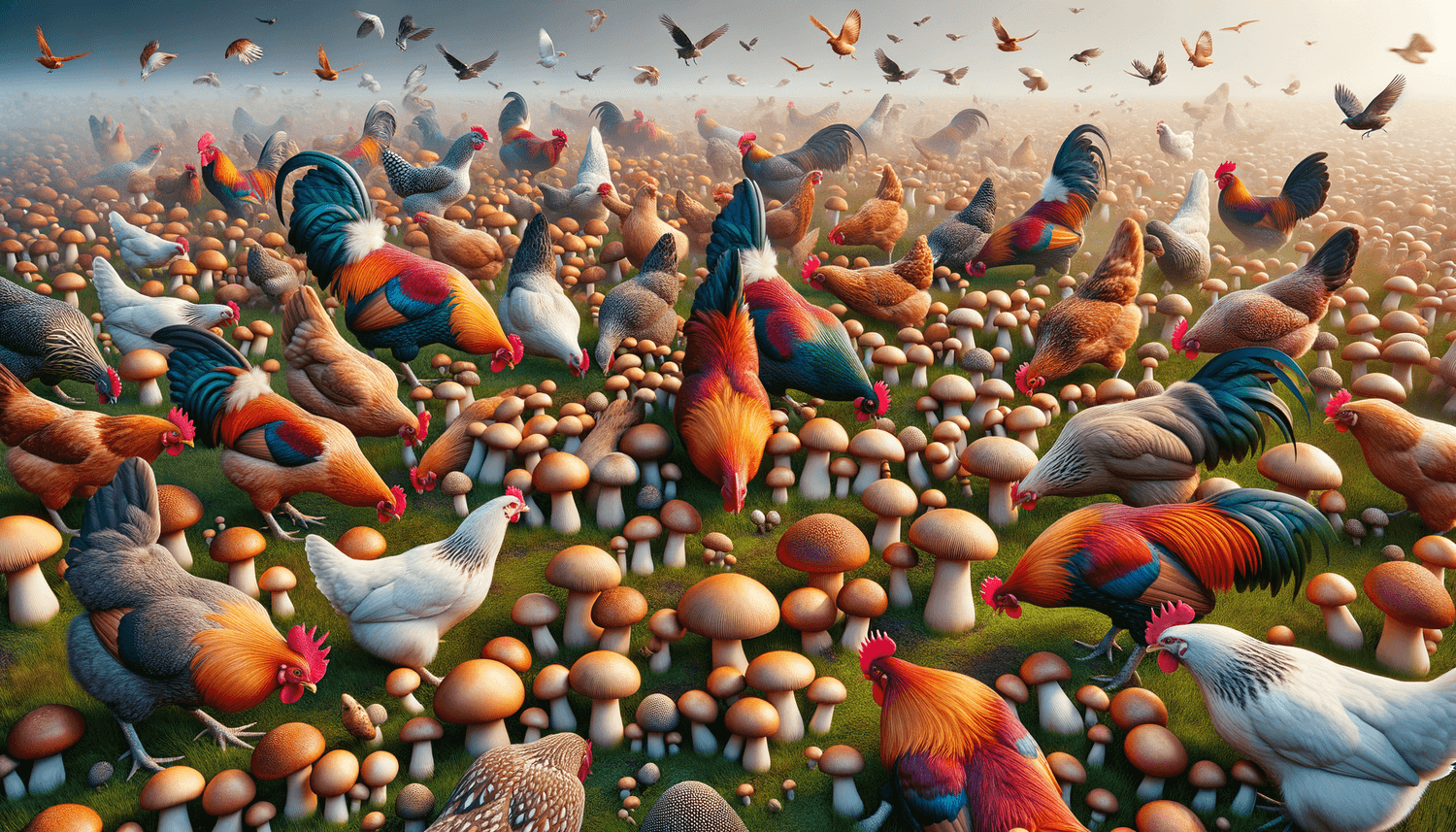Hey there, feathered-friends enthusiasts! Have you ever wondered if your backyard chickens can snack on mushrooms alongside you during a tantalizing pizza night or scrumptious stir-fry dinner? Well, today we’re going to explore whether chickens can eat mushrooms or not, dive into the importance of maintaining a balanced diet for your beloved egg-layers, and discuss any potential benefits, risks and nutritional value mushrooms might hold. We’ll also cluck our way through the best ways to prepare this fun-guy (get it? Fungi!) based treat for your chickens. So, let’s flap our wings and embark on a mycelium adventure!
Can chickens eat mushrooms?
Yes, chickens can eat mushrooms, but it’s important to be cautious. While many store-bought or cultivated mushrooms are safe for chickens to consume, there are wild mushrooms that can be toxic and harmful to their health. As a responsible chicken owner, always make sure you provide only safe and non-toxic varieties of mushrooms to your flock.
Chickens need a balanced diet too!
Just like us, our feathered friends thrive on a balanced diet that provides them with all the essential nutrients they need to lead a healthy life. A chicken’s diet should primarily consist of a high-quality chicken feed, which should make up around 80-90% of their diet. Chicken feed is specially formulated to deliver the right combination of proteins, vitamins, minerals, and carbohydrates that hens require for optimal egg production, growth, and overall well-being.
As for the remaining 10-20% of their diet, that’s where you can introduce a variety of tasty treats to delight your flock, such as fruits and vegetables. These treats not only add excitement to your chickens’ culinary experience, but also provide additional valuable nutrients, vitamins, and minerals that can contribute to their health. However, always bear in mind that treats should never replace the central role that chicken feed plays in your chickens’ diet. Ensuring a proper balance will keep your backyard pals happy, healthy and productive!
Nutritional value of mushrooms for chickens.
Feeding safe, non-toxic mushrooms to chickens can provide some nutritional benefits. One notable aspect of mushrooms is their high water content, which can help with hydration, especially during hot summer days when chickens need extra water to maintain their body temperature. Moreover, mushrooms are low in calories and high in fiber, making them a healthy snack option for your flock.
When it comes to vitamins and minerals, mushrooms contain a good amount of B vitamins, such as B2 (riboflavin), B3 (niacin), and B5 (pantothenic acid). These vitamins are important for maintaining healthy skin, feathers, and beak as well as supporting the chicken’s nervous system. Additionally, mushrooms offer a source of essential minerals like potassium and selenium, which contribute to the overall well-being of your chickens by supporting their immune system and promoting strong bones, respectively. Some varieties of mushrooms also contain small amounts of vitamin D, but the quantity is not significant enough to significantly contribute to their dietary needs.
While mushrooms can provide these nutrients, it’s worth mentioning that chickens can receive most of these essential vitamins and minerals through their primary diet of chicken feed. However, supplementing their diet with mushroom treats can still offer healthful benefits and add diversity to their meals. To prevent potential risks, remember to only serve safe and non-toxic mushrooms to your feathered friends.
Nutrition table of mushrooms for chickens.
| Information | Description |
|---|---|
| Nutritional Value | High in fiber, B vitamins, potassium, and selenium; low in calories. |
| Suggested Serving Size | Small portions, served in moderation as a treat; should not replace chicken feed. |
| Safe Feeding Practices | Only provide cultivated, store-bought or known non-toxic mushrooms; avoid wild mushrooms that could be toxic. |
| Preparation | Wash and slice into small, manageable pieces for easy consumption; cooked or raw. |
| Potential Risks | Toxic wild mushrooms can cause severe health issues; always ensure mushrooms are safe for consumption. |
| Hydration | High water content in mushrooms aids in hydration, especially during hot summer days. |
| Digestion | Low calorie, high fiber content promotes healthy digestion. |
| Seasonal Availability | Store-bought or cultivated mushrooms are available year-round; wild mushrooms are typically found in spring and autumn. |
| Other Benefits | Adds variety, provides healthful benefits, and helps maintain overall well-being of the chicken. |
Preparing mushrooms for your chickens
When it comes to introducing mushrooms to your backyard flock, proper preparation is key. First thing, thoroughly wash the mushrooms to remove any dirt or contaminants. You can choose to serve the mushrooms raw or cooked; however, cooking the mushrooms can make it easier for your chickens to digest them while also eliminating any potential harmful bacteria.
It’s best to slice the mushrooms into small, manageable pieces, as this will make it easier for your chickens to peck at and consume. Once the mushrooms are prepared, you can simply mix them in with their regular feed or scatter them around your chickens’ enclosure to encourage natural foraging behavior.
Practicing caution with wild mushrooms
While some wild mushrooms are safe for chickens to eat, keep in mind that several varieties might be toxic to them, just like they are for humans. It is crucial not to feed your chickens any wild mushrooms you find in your yard or forested areas, as it can be challenging to determine which species are safe to consume. To avoid the risk entirely, always stick to known, safe, and non-toxic mushrooms, such as those found in your local supermarket.
In conclusion
Feeding your chickens safe, non-toxic mushrooms can be a tasty and nutritious treat for both you and your feathered friends. Remember to practice precaution when selecting and preparing mushrooms, and provide them in moderation, ensuring a balanced diet for your backyard flock. By following these guidelines, you’ll be well on your way to keeping your chickens happy, healthy, and clucking contentedly!

















